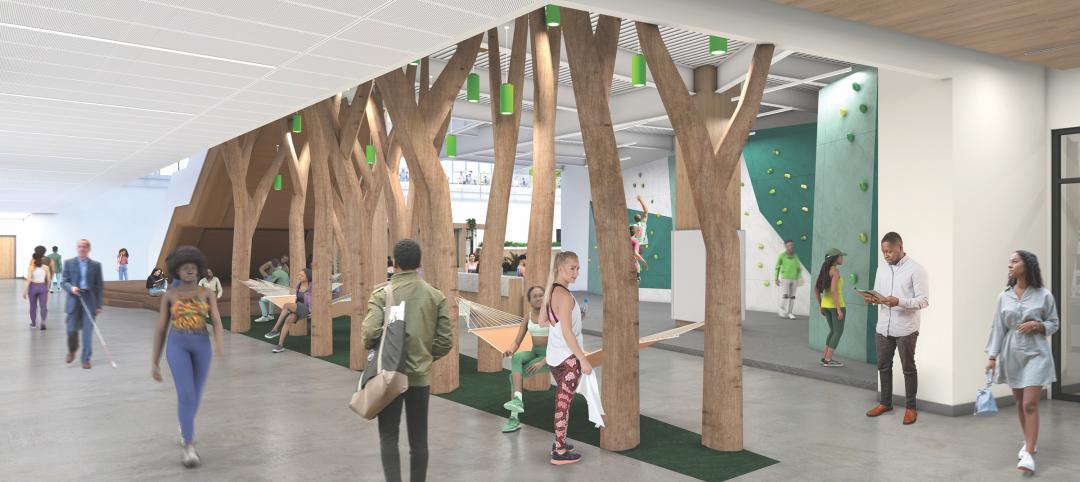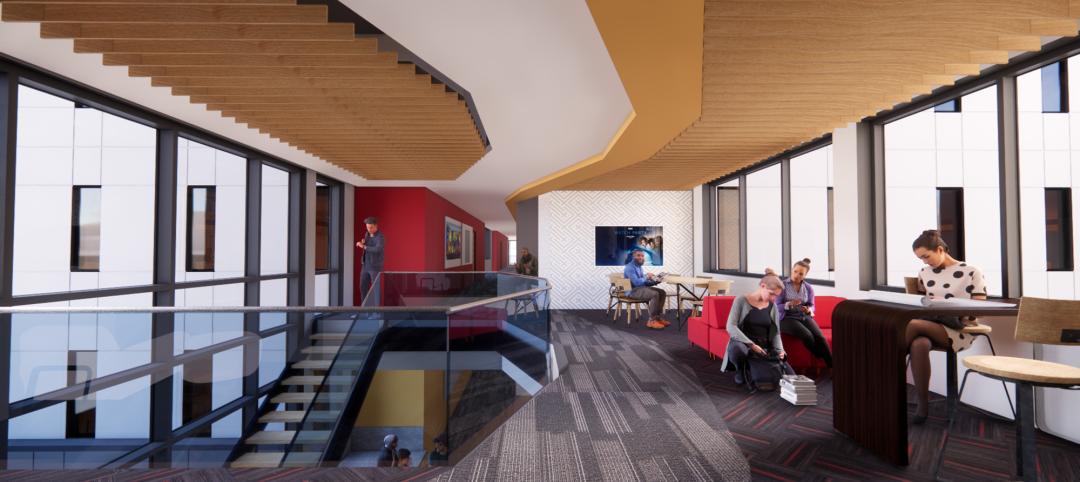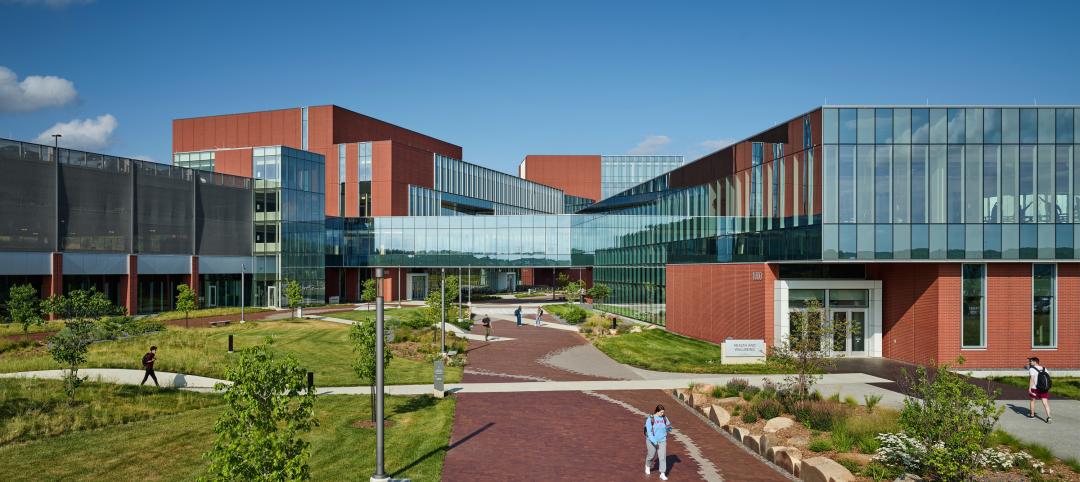The American Institute of Architects (AIA) today announced publication of 2030 by the numbers, the 2016 progress report assessing the work of architecture firms that are part of the AIA 2030 Commitment, a voluntary initiative to commit their practices to advancing the AIA’s goal of carbon-neutral buildings by the year 2030. The report is available and can be viewed here.
The 2030 Commitment represents a key part of the AIA membership's dedication to combating climate change, particularly with the recent U.S. withdrawal from the Paris Agreement. Despite that withdrawal, firms that sign on to and actively participate in the 2030 Commitment continue to directly support the goals of the climate accord, as part of the AIA's position that architects can—and should—mitigate the effects of climate change through policy advocacy, education, and energy modeling.
Key takeaways from the 2016 Progress Report:
- Projects reported an average predicted energy use intensity (pEUI) savings of 42 percent in 2016, climbing from 38 percent in 2015 and continuing the steps forward that the 2030 Commitment has taken over the last few years.
- The AIA 2030 energy target of 70 percent predicted energy savings is ambitious but achievable. In 2016 six firms achieved a portfolio-average predicted energy savings of 70 percent or greater, and 331 individual projects also met or exceeded this target.
- In 2016, the number of reporting firms grew 15 percent to 205. Additionally, with 53 new firms signing on to the Commitment, the overall number of signatories now totals more than 400.
- The potential energy savings from all 2016 projects represent approximately 16.7 million metric tons of greenhouse gas emissions - the equivalent of running almost five coal-fired power plants or powering 1.76 million homes for a year (EPA Greenhouse Gas Equivalencies Calculator).
- AIA data continues to demonstrate that energy modeling is an essential component of success, with modeled projects averaging pEUI reductions of just over 50 percent, as compared to only a 35 percent pEUI reduction for projects that were not modeled. However, as the share of modeled projects declined from 2015, more work is needed to better incorporate energy modeling across the profession.
Since 2009, participants in the AIA 2030 Commitment have reported the performance of their architecture firm portfolios over each calendar year. The data, collected via the 2030 Design Data Exchange (DDx), includes building type, area, baseline energy performance, and predicted energy performance. Among the data points reported are firm participation, total area of number of projects reported, percentage of projects that used energy modeling, and overall progress toward the 2030 goals.
Related Stories
Construction Costs | Oct 16, 2024
Construction Crane Index: Most major markets’ crane counts increase or hold steady in third quarter
Rider Levett Bucknall’s (RLB’s) latest Crane Index and Quarterly Cost Report shows continued decreasing cost inflation and crane counts increasing or holding steady in 10 of the 14 major markets it surveyed. The national average increase in construction costs was 1.07%, the lowest it’s been in the last three years.
AEC Tech | Oct 16, 2024
How AI can augment the design visualization process
Blog author Tim Beecken, AIA, uses the design of an airport as a case-study for AI’s potential in design visualizations.
University Buildings | Oct 15, 2024
Recreation and wellness are bedfellows in new campus student centers
Student demands for amenities and services that address their emotional and mental wellbeing are impacting new development on college campuses that has led to recreation centers with wellness portfolios.
Higher Education | Oct 14, 2024
Higher education design for the first-gen college student
In this Design Collaborative blog, Yogen Solanki, Assoc. AIA, shares how architecture and design can help higher education institutions address some of the challenges faced by first-generation students.
Performing Arts Centers | Oct 10, 2024
Studio Gang's performing arts center for Hudson Valley Shakespeare breaks ground
A new permanent home for Hudson Valley Shakespeare, a professional non-profit theater company, recently broke ground in Garrison, N.Y. The Samuel H. Scripps Theater Center includes a 14,850 sf performance venue that will serve as a permanent home for the theater company known for its sweeping open-air productions of classics and new works.
Sustainable Design and Construction | Oct 10, 2024
Northglenn, a Denver suburb, opens a net zero, all-electric city hall with a mass timber structure
Northglenn, Colo., a Denver suburb, has opened the new Northglenn City Hall—a net zero, fully electric building with a mass timber structure. The 32,600-sf, $33.7 million building houses 60 city staffers. Designed by Anderson Mason Dale Architects, Northglenn City Hall is set to become the first municipal building in Colorado, and one of the first in the country, to achieve the Core certification: a green building rating system overseen by the International Living Future Institute.
3D Printing | Oct 9, 2024
3D-printed construction milestones take shape in Tennessee and Texas
Two notable 3D-printed projects mark milestones in the new construction technique of “printing” structures with specialized concrete. In Athens, Tennessee, Walmart hired Alquist 3D to build a 20-foot-high store expansion, one of the largest freestanding 3D-printed commercial concrete structures in the U.S. In Marfa, Texas, the world’s first 3D-printed hotel is under construction at an existing hotel and campground site.
University Buildings | Oct 9, 2024
Des Moines University Medicine and Health Sciences opens a new 88-acre campus
Des Moines University Medicine and Health Sciences has opened a new campus spanning 88 acres, over three times larger than its previous location. Designed by RDG Planning & Design and built by Turner Construction, the $260 million campus features technology-rich, flexible educational spaces that promote innovative teaching methods, expand research activity, and enhance clinical services. The campus includes four buildings connected with elevated pathways and totaling 382,000 sf.
Student Housing | Oct 9, 2024
University of Maryland begins work on $148 million graduate student housing development
The University of Maryland, in partnership with Campus Apartments and Mosaic Development Partners, has broken ground on a $148.75 million graduate student housing project on the university’s flagship College Park campus. The project will add 741 beds in 465 fully furnished apartments.
Healthcare Facilities | Oct 9, 2024
How healthcare operations inform design
Amanda Fisher, Communications Specialist, shares how BWBR's personalized approach and specialized experience can make a meaningful impact to healthcare facilities.

















